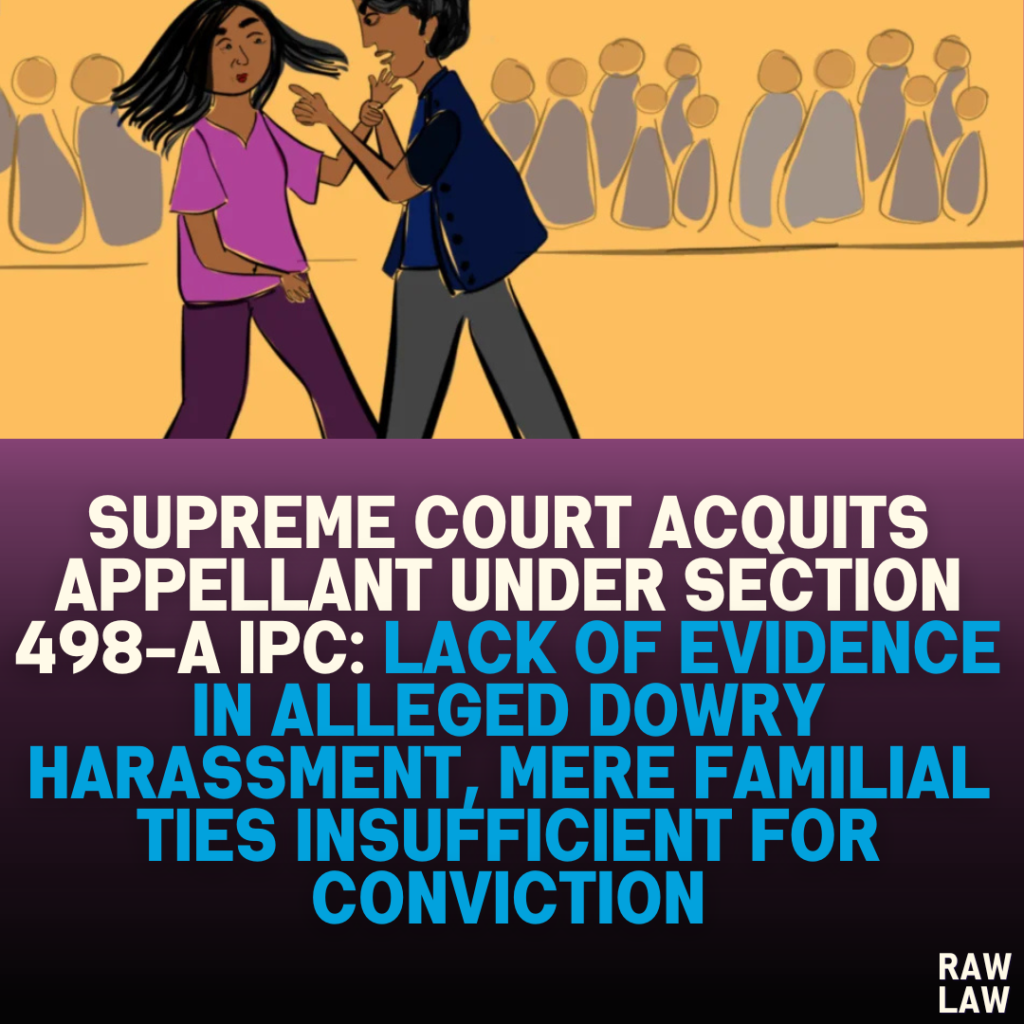Court’s Decision:
The Supreme Court set aside the conviction of the appellant under Section 498-A of the Indian Penal Code (IPC), stating that there was no evidence to support the charge. The appellant’s conviction was deemed “perverse” due to the absence of any substantial evidence linking him to the crime. The Court held that over-implication in such cases can have dire consequences, and the appellant was acquitted.
Facts:
The case originated from an FIR lodged by the father of the deceased, Renuka, following her unnatural death. Renuka, who was married to the first accused, was allegedly subjected to harassment and cruelty for dowry, specifically a demand for Rs. 5 lakhs to purchase a residential flat. Several individuals, including the appellant, were implicated in the case, which led to a trial where they were charged under Sections 498-A, 304-B, 306, and 406 of the IPC. However, the appellant was convicted solely under Section 498-A and sentenced to three years of rigorous imprisonment.
Issues:
The key issue before the Court was whether the appellant, a relative by marriage to the deceased’s in-laws, had participated in subjecting the deceased to cruelty as defined under Section 498-A of the IPC.
Petitioner’s Arguments:
The appellant contended that his marriage to the second accused (the sister of the deceased’s husband) occurred only in October 2010, five months before Renuka’s death. He argued that there was no evidence to support his involvement in the alleged dowry harassment, as he had not been a relative of the deceased’s family during the time the primary allegations were made. Furthermore, he claimed that there were no specific accusations against him, and his implication in the case was a result of overzealous prosecution.
Respondent’s Arguments:
The respondents argued that both the trial court and the High Court had carefully considered the evidence and found the appellant guilty based on the testimonies of the witnesses. They maintained that the conviction under Section 498-A was based on the appellant’s complicity in the harassment and cruelty faced by the deceased.
Analysis of the Law:
Section 498-A of the IPC addresses cruelty inflicted by a husband or his relatives on a woman. To establish guilt under this section, the prosecution must prove that the victim was subjected to harassment or cruelty by her husband or his relatives. The cruelty must either be linked to a demand for dowry or of such a nature that it could drive the woman to suicide or cause grave harm to her health.
Precedent Analysis:
The Court referred to the judgment in Preeti Gupta v. State of Jharkhand [(2010) 7 SCC 667], emphasizing the tendency of over-implication in dowry-related cases and the need for courts to carefully examine the evidence to prevent injustice. The Court noted that exaggerated versions of incidents are common in such cases, and without specific evidence, an accused cannot be held liable.
Court’s Reasoning:
The Supreme Court observed that there was no specific evidence against the appellant linking him to any acts of cruelty toward the deceased. The appellant’s marriage occurred only months before the incident, and there was no indication that he had any significant interaction with the deceased that could substantiate the allegations of harassment or cruelty. The Court emphasized that guilt under Section 498-A cannot be established without concrete evidence, and in the appellant’s case, none existed. Additionally, other individuals similarly situated had been acquitted, further weakening the case against the appellant.
Conclusion:
The Supreme Court concluded that the appellant’s conviction was unsustainable due to the lack of evidence and set aside the judgments of both the trial court and the High Court. The appellant was acquitted of all charges under Section 498-A.
Implications:
This judgment highlights the importance of preventing over-implication in cases involving allegations of dowry harassment. It underscores the need for careful scrutiny of evidence to avoid unjust convictions and emphasizes that mere familial ties to the accused cannot be grounds for guilt under Section 498-A of the IPC. The Court also reiterated the role of judicial discretion in identifying cases where accusations may be inflated or unsupported by substantial evidence.




Pingback: Chhattisgarh High Court Denies Bail to Accused Charged with Conspiracy and Grievous Assault Under BNSS 2023, Citing Petitioner's Direct Role in Facilitating Crime and Severity of Victim's Injuries - Raw Law